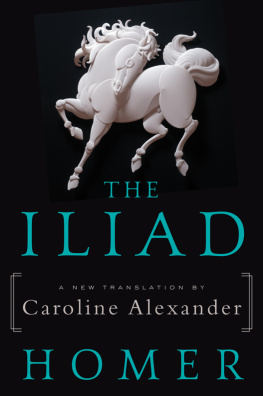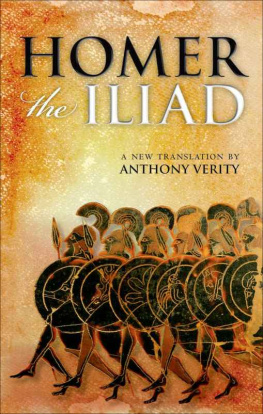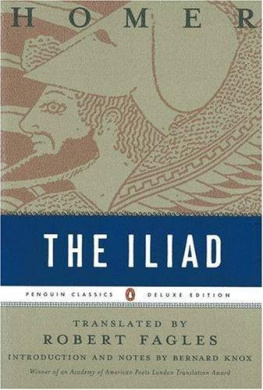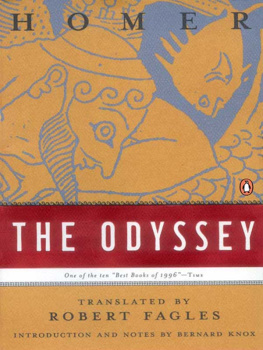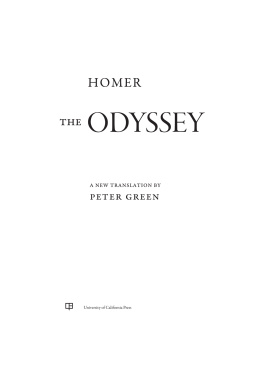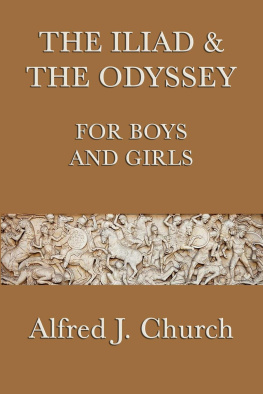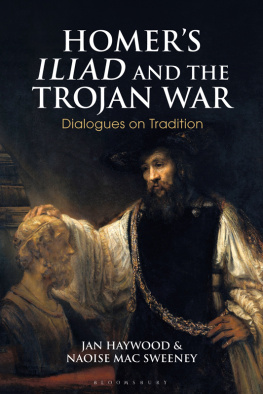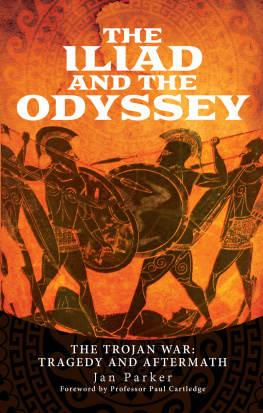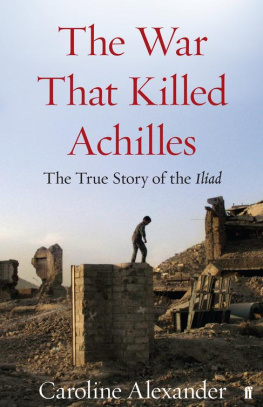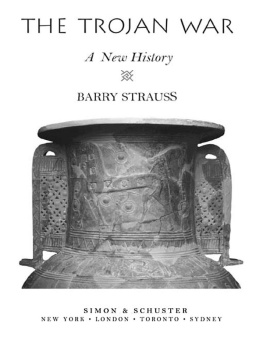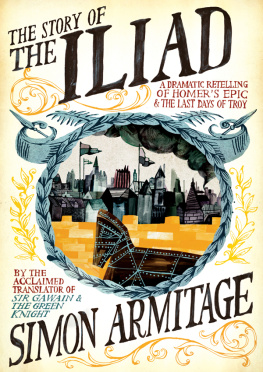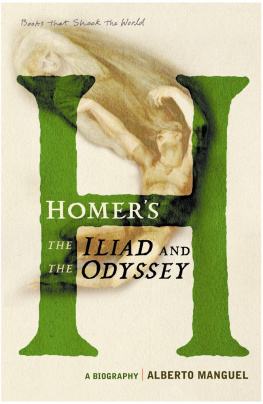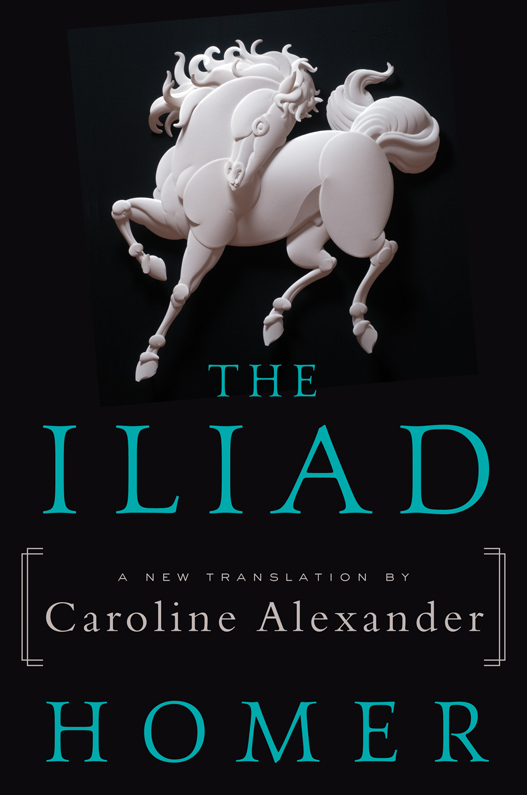TO ELIZABETH ANN KIRBY My mother, who always knew that I would do this CONTENTS
Guide
T he
Iliad begins its story in the tenth and final year of the Trojan War, which has ground to a stalemate between the two opposing armiesthe invading Achaeans, as Homer calls the Greeks, and the besieged Trojans, who are fighting for their city, which lies only a few days sail from the Greek mainland, and which they call both Troy and Ilion. The cause of the war was the seduction and abduction of Helen, the beautiful wife of king Menelaos of Sparta, by handsome Paris (also called Alexandros), one of the many sons of Troys king, Priam. Mustered from all over the Greek mainland and islands under the command of Menelaos wealthy and powerful brother, Agamemnon, king of Mycenae, the Achaeans have grown weary of the war. Their ships, beached at the edge of the Trojan plain, are decaying with disuse. Their greatest warrior, Achilles, has just publicly denounced, in the most bluntly brutal terms, both the war and his commander, and it appears that much of the Achaean host shares Achilles view that the war is no longer worth fighting. For their part, the besieged Trojans are increasingly desperate.
Hemmed inside their city walls, they and their regional allies have long been preyed upon by marauding Achaeans, and their resources are dwindling. Suddenly, unexpectedly, feckless Paris turns to his brother, Hector, the heroic warrior upon whom the Trojans most depend, and makes a welcome suggestion: he will personally challenge Menelaos to a duel. The two chief protagonists of the conflict, then, will fight it out man-to-man and the rest of their armies, Achaean and Trojan, can leave in friendship and peace. Swiftly Hector announces this offer to the Achaeans and after an anxious hushthe Iliad gives a number of tactful hints that the Achaeans do not regard Menelaos as the mightiest of their warriorsMenelaos accepts, and a treaty is cut to sanctify the outcome of the duel. So he spoke, and both Achaeans and Trojans rejoiced,hoping to make an end of the sorrowful war.And they reined the chariots into line, and themselves descendedand took off their armor, and placed it on the groundclose together, and there was little earth left between....And thus would a man speak, both Trojan and Achaean;Zeus most glorious and greatest, and all you immortal gods,those who first do harm in violation of the sacred treatyon whichever side they bemay their brains flowthusupon the ground, like this wine,and the brains of their children, and may their wives be forced by other men.So they spoke; but the son of Cronus did not accomplish this for them. It is a remarkable scene in a great war epicthe warriors of both armies making violent prayer to go home in peace. Lugrs, poldakrus, duseleges, ainswretched, accompanied by many tears, bringing much woe, dreadthese are the adjectives the Iliad uses for war. Lugrs, poldakrus, duseleges, ainswretched, accompanied by many tears, bringing much woe, dreadthese are the adjectives the Iliad uses for war.
Every mortal being at Troy, man and woman, warrior and civilian, wants the bloody and exhausting Trojan War to end. The Iliad, above all else, is a powerful, first-rate story, whose dramatic action is wrapped around such time-tested themes as insulted honor, love, loss, and revenge. Its cast of characters, mortal and divine, is among the most enduring and compelling in all of literature, and it is through their words and fates that the epic asserts its tragic vision. But central to this tragic vision is the Trojan War. The war is not merely a dramatic backdrop for heroic action, nor, as I was taught at times, a poetic metaphor for the human struggle and experience. The Iliad is riveted on what may be called the enduring realities of war: the fact that an individual warrior must risk his life for a cause in which he does not believe, or must subject himself to the command of a lesser man; or that a successful warrior needs not only skill, but the good luck of being loved by the godsand that these same gods are fickle, and the outcome of any combat mission is therefore fraught with mortal uncertainty; above all that war blights every life it touches.
Warriors, Greek and Trojan, the women they capture and the women they love, those too young to fight and those too old, the victorious and the vanquished, the wounded, the dying, the deadthe fate of all are evoked by the Iliad. And all the while looming ever closer through the dust of battle is the imminent destruction of the city of Troy and all her people as casualties of the hated war. Compassionate but clear-eyed, the Iliad evokes the bedrock fact of the human experience, namely that every mortal being, even the greatesteven an Achillescannot escape death. And this terrifying truth is seen in high relief because this is a war story, and tragic loss and mortality are never more nakedly revealed than in time of war. The Iliad opens upon a scene of plague raging through the Achaean camp. The Achaean hero Achilles, the greatest warrior fighting at Troy, calls an emergency assembly. Here Calchas, prophet and seer to the army, reveals that the god Apollo sent the plague as retribution for the mistreatment of one of his priests at the hands of Agamemnon, the king of wealthy Mycenae and commander-in-chief of the diverse Achaean host.
The priests daughter had been seized along with other plunder on a recent raid, and when the aged priest came to the Achaean camp to offer ransom for her, Agamemnon harshly rebuffed him. Now, Calchas declares, the only remedy is for Agamemnon to surrender the girl to her father. This straightforward solution is angrily rejected by Agamemnon, who sees himself diminished by the loss of his prize. When Achilles steps in both to rebuke and to encourage compliance, a bitter quarrel erupts between the two men. Agamemnon threatens to take Achilles own prize, a young woman named Brises, who was also captured in a raiding party, but whom Achilles has come to love. Achilles in his turn angrily withdraws himself and his men, the Myrmidons, from the war, and also threatens to return to his home in Thessaly.
Stubbornly, Agamemnon refuses to relent. He duly returns the priests daughter, but then dispatches heralds to conduct Brises from Achilles quarters to his own. The subsequent action is concerned with the repercussions of Achilles wrath. At Achilles request his mother, the sea goddess Thetis, goes to Zeus, the almighty ruler of Olympus, to beg a favor for her son. Achilles is destined to be short-lived, she reminds him, and therefore he should at least win honor. Her request of Zeus is that he safeguard this honor by ensuring that Agamemnon be made to feel the loss of his greatest warrior, and so come to regret his taking of Achilles prize.
Zeus bows his head in assent, and the tide of battle turns disastrously against the Achaeans. At length, with all his other best warriors wounded, Agamemnon sends a delegation to Achilles, who has been sitting idle by his ships, to beg that he return to battle in exchange for a dazzling array of gifts. But Achilles, during this unaccustomed absence from fighting, has come to see the value of his life. He has two possible fates, he tells the delegation: For my mother tells me, the goddess Thetis of the silver feet,that two fates carry me to deaths end;if I remain here to fight around the city of the Trojans,my return home is lost, but my glory will be undying;but if I go home to the beloved land of my father,outstanding glory will be lost to me, but my life will be long.

